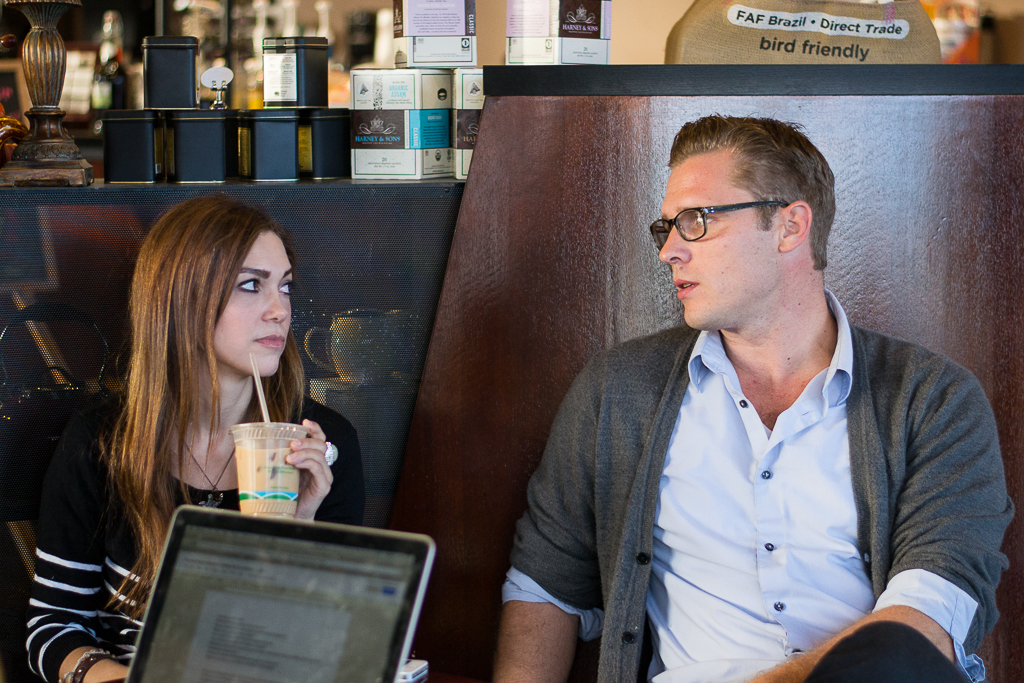
While most theological debates on Facebook end in inflated egos and insulting language, the debate between Yara Brighton, an ex-Christian, and biblical studies professor Thaddeus Williams, an ex-atheist, ended in the publication of a book.
The debate started in July when Brighton, Williams’ acquaintance from high school, commented on an infographic Williams posted on Facebook explaining some of God’s attributes according to the Bible.
Thinking that the comments would simply become a refreshing and bully-free exchange of ideas about God, Williams kept up the conversation with Brighton. But they weren’t the only ones participating.
With more than 200 people following and sharing the conversation and more than 200 comments on the graphic, according to Williams, it was clear that he and Brighton weren’t alone in their desire to have a respectful conversation about difficult theological issues.
Turning raw dialogue into a book
At a coffee shop in their hometown of Mission Viejo, the co-authors sat down together to talk about their book and their new phase of friendship as each of their daughters played together at a nearby table.
“It seems like we’ve struck a chord with people who don’t want to shy away from these issues and don’t want to hurt each other’s feelings,” said Williams, who teaches History of Atheism at Saddleback College in addition to Theology I and II at Biola.
Brighton and Williams have turned their raw dialogue into a free digital book titled, “The Exchange: An Ex-Atheist and an Ex-Christian Square Off on God, Meaning, and Other Questions You Should Probably Care About,” with a new chapter released weekly to an estimated audience of 2,000 and counting.
The book is published through a new publishing company, AIMBooks, where the reader gets access to the book while it is being written.
“You get a chapter a week where you can sit down and read it in 20 minutes. That keeps you in the conversation as it unfolds more organically,” Williams said.
Because of the nature of the conversation, readers get an authentic look at the belief systems of each person. For example, Brighton candidly shares why she doesn’t miss Christianity and Williams explains ways in which he has doubted the Bible.
Readers have responded positively to the book, according to Williams, saying that it’s caused them to question their beliefs in all the right ways. People from all worldviews and walks of life are being drawn to the book as it spreads — Brighton even had a Home Depot worker recognize her as she was shopping.
An unlikely team that works
While the content currently released comes from their existing conversation on Facebook, the co-authors are working on new chapters in the same writing style as the initial ones — uninhibited and conversational with a dose of friendly sarcasm.
Brighton and Williams are an unlikely team. Williams abandoned his former atheism while Brighton, in her own words, broke up with God. Their pasts, however, have contributed to a deeper understanding of and respect for each other’s point of view.
“I don’t like the church in general,” Brighton said, “but if Christianity could look like the way I’ve seen Thad [Williams] practice it, I think it could be a really great thing, whether or not I believe it. I really like his expression of faith because it’s really sincere, it’s honest, it’s raw.”
The respect is mutual because Williams values Brighton’s emotional response to evil both globally and in the church, he said.
“I see a whole lot more Jesus in her reaction to pain and evils than I see in a lot of my Christian brothers and sisters. The church can learn a whole lot from the Jesus-like emotional life of an ex-Christian,” Williams said.
Through the publication of “The Exchange,” the friends seek to encourage dialogue between theists and atheists as they hopefully model what a healthy conversation looks like — not hurting one another with cruelty nor dancing around the meat of the issue.
Learning to have a balanced dialogue
Williams, a Biola alumnus, admits that this balanced dialogue did not come naturally to him — he sees a parallel in his process of learning kung fu. As a beginner with a white belt, Williams broke two people’s noses in one month because he was learning combative moves but didn’t know how to control them.
“That’s kind of how I was at Biola, learning a lot of theology, taking my Bible units,” Williams said. “I realized that for a few years I was kind of this theological white belt where I knew enough information to really hurt people with it.”
Over the years, Williams said, God has improved his ability to present his beliefs winsomely in a way that reflects the character of Jesus more than burning the other person. The book brings these learnings to life as the reader watches an interaction with a nonbeliever happen right in front of them.
The genuine care that Williams and Brighton have for each other and willingness to have an exchange in the first place is something they hope readers will pick up on and implement in their own lives.
“There’s tribalism right now in our culture where Christians hang out with Christians,” Williams said. “We speak our own private dialect of Christianese.”
“PTL,” Brighton added, referring to the popular abbreviation for “praise the Lord.”
When Williams stopped talking and looked at her, Brighton explained her interjection with a playful smile.
“I was one of you.”







